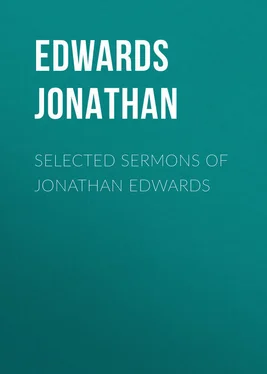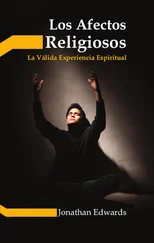Jonathan Edwards - Selected Sermons of Jonathan Edwards
Здесь есть возможность читать онлайн «Jonathan Edwards - Selected Sermons of Jonathan Edwards» — ознакомительный отрывок электронной книги совершенно бесплатно, а после прочтения отрывка купить полную версию. В некоторых случаях можно слушать аудио, скачать через торрент в формате fb2 и присутствует краткое содержание. Жанр: foreign_religion, foreign_antique, foreign_prose, на английском языке. Описание произведения, (предисловие) а так же отзывы посетителей доступны на портале библиотеки ЛибКат.
- Название:Selected Sermons of Jonathan Edwards
- Автор:
- Жанр:
- Год:неизвестен
- ISBN:нет данных
- Рейтинг книги:3 / 5. Голосов: 1
-
Избранное:Добавить в избранное
- Отзывы:
-
Ваша оценка:
- 60
- 1
- 2
- 3
- 4
- 5
Selected Sermons of Jonathan Edwards: краткое содержание, описание и аннотация
Предлагаем к чтению аннотацию, описание, краткое содержание или предисловие (зависит от того, что написал сам автор книги «Selected Sermons of Jonathan Edwards»). Если вы не нашли необходимую информацию о книге — напишите в комментариях, мы постараемся отыскать её.
Selected Sermons of Jonathan Edwards — читать онлайн ознакомительный отрывок
Ниже представлен текст книги, разбитый по страницам. Система сохранения места последней прочитанной страницы, позволяет с удобством читать онлайн бесплатно книгу «Selected Sermons of Jonathan Edwards», без необходимости каждый раз заново искать на чём Вы остановились. Поставьте закладку, и сможете в любой момент перейти на страницу, на которой закончили чтение.
Интервал:
Закладка:
5 5 Solomon Clark, Historical Catalogue of the Northampton First Church , pp. 40-67 (Northampton, 1891), prints the list in full.This, however, represents but a small part of his influence in these years. Both by his preaching in Northampton and elsewhere and by his published writings, notably his printed sermons and his works dealing with the revivals, in which must be included his treatise on the Religious Affections, he powerfully affected the currents of religious thought and life throughout New England and the neighboring colonies and, to some extent also, in England and Scotland. His mission had been to recall the Puritan churches, which for some seventy years had languished in a period of decline, to the old high Puritan standards both of creed and of conduct, and to infuse into them a new spirit of vital piety. In this he was largely successful; and still to-day, in spite of wide departures from his theological system, he remains an effectual spiritual force in the churches inheriting the Puritan tradition.
The estrangement between Edwards and his people began in 1744, in connection with a case of discipline in which a large number of the youth belonging to the leading families of the town were brought under suspicion of reading and circulating immoral books. 6 6 See note, p. 179 .
During the excitement of the revival the people had willingly accepted his high demands. But now, in the reaction, flesh and blood rebelled. Edwards, however, was not the man to accommodate the claims of religion, as he conceived those claims, to the weaknesses of human nature. It would not be strange if, under the circumstances, the people looked on their minister as something of a spiritual dictator, exercising a kind of spiritual tyranny. Still, this feeling, so far as it then existed, was not likely to have led to an open rupture, had it not been that four years later, on occasion of an application – the first in those years – for membership in the church, Edwards sought to impose a new test of qualification. He required, namely, that the candidate for full communion should give evidence of being converted, and as such converted person, should make a public profession of godliness. This restriction ran counter to the principles and usage established by Mr. Stoddard, accepted by most of the neighboring churches, and hitherto followed by Edwards himself, according to which, not only might persons be admitted to church membership on the terms of the “Halfway Covenant,” but they might come to the Lord’s Supper, if they desired to do so, even without the assurance of conversion, the hope being that the rite might itself prove a converting ordinance. Edwards was now openly charged with seeking to lord it over the brethren, and the indignation was intense. He, on his part, was convinced of the correctness of his position, and was prepared to maintain it at all costs. The unhappy controversy lasted for two years: Edwards dignified, courteous, disposed to be conciliatory, yet insisting on the recognition of his rights, and showing throughout his great moral and intellectual superiority; the people prejudiced, obstinate, refusing even to consider his views or to allow him to set them forth in the pulpit, bent only on getting rid of him. Finally, on June 22, 1750, the Council, convened to advise on the matter, recommended, by a vote of 10 to 9, the minority protesting, that the pastoral relations should be dissolved. The concurrent sentiment of the church was expressed by the overwhelming vote of about 200 to 20 of the male members. The next Sunday but one Edwards preached his Farewell Sermon. 7 7 It is impossible here to go into the history of this famous controversy. Something concerning it will be found in the notes, pp. 172 ff.; Dwight, op. cit. , pp. 298-448, prints the documents from Edwards’s Journal in full; the records of the church are silent. It should be stated, perhaps, in fairness to the Northampton people, that the pastoral relation was not then, as is sometimes supposed, regarded as indissoluble; six clergymen were “dismissed” from neighboring churches between 1721 and 1755. Moreover, Edwards, eminent as he undoubtedly was as a preacher, was to them only the parish minister; his great fame as a theologian was established later. Cf. Trumbull, History of Northampton , II, 225. It is also not unreasonable to suppose that the spiritual capacities of the people had been overstimulated. The later repentance of Joseph Hawley (see Dwight, op. cit. , p. 421), Edwards’s cousin, who had taken a leading part in the movement against him, concerns only the spirit of the opposition; it does not seriously question the wisdom, under the circumstances, of the separation.
Edwards was now forty-six years of age, unfitted, as he says, for any other business but study, and with a “numerous and chargeable family” to face the world with. The long controversy and the circumstances attending the dismissal had had a depressing effect on his spirits, and the outlook seemed to him gloomy in the extreme. But his trust was in God, and friends did not fail. From Scotland came the offer of assistance in procuring him a charge there; his Northampton adherents desired him to remain and form a separate church in the town. Early in December he received a call from the little church in Stockbridge, on the frontier, and about the same time an invitation from the Commissioners in Boston of the “Society in London for Propagating the Gospel in New England and the parts adjacent” to become their missionary to the Indians, who then formed a large part of the Stockbridge settlement. After acquainting himself by a residence of several months in Stockbridge with the conditions of the work, and after receiving satisfactory assurances, in a personal interview with the Governor, with regard to the conduct of the Indian mission, he accepted both of these proposals. He had scarcely done so when he received a call, with the promise of generous support, from a church in Virginia.
The opposition which had driven him from Northampton followed him to Stockbridge. For several years a persistent effort was made to obstruct his work, particularly his work among the Indians, and even to secure his removal. But he successfully met this opposition, won the confidence of the Indians, and greatly endeared himself to the “English.” Here, too, in the wilderness he found time and opportunity for the writing of those great treatises on the Freedom of the Will, on the End for which God created the World, on the Nature of True Virtue, and on the Christian Doctrine of Original Sin, which are the principal foundation of his theological reputation.
Meanwhile an event had occurred in Edwards’s family destined to have important consequences – the marriage of his daughter Esther to the Rev. Aaron Burr, President of Nassau Hall, in Princeton. 8 8 Aaron Burr, the Vice-President of the United States, who killed Alexander Hamilton in a duel, was their son.
In September, 1757, Mr. Burr died; two days later, the Corporation appointed Edwards as his successor. Edwards was for various reasons reluctant to accept the appointment; he mistrusted his fitness, he especially feared that the duties of the office would seriously interrupt the literary work in which he was now engrossed. Nevertheless, on the recommendation of a Council called at his desire to advise in the matter, he accepted the call. He left Stockbridge in January, and toward the end of the month reached Princeton. But the only work he did as President of the College was to preach for five or six Sundays and to give out themes in divinity to the Senior Class, with whom he afterwards discussed their papers on them. The small-pox was epidemic in the town when he arrived, and as a precautionary measure he had himself inoculated. The disease, mild at first, developed badly, and on March 22, 1758, he died. From his death-bed he sent this tender and characteristic message to his wife, who was still in Stockbridge: “Give my kindest love to my dear wife, and tell her that the uncommon union, which has so long subsisted between us, has been of such a nature, as, I trust, is spiritual, and therefore will continue forever.” His last words, also characteristic, were, “Trust in God, and ye need not fear.”
Интервал:
Закладка:
Похожие книги на «Selected Sermons of Jonathan Edwards»
Представляем Вашему вниманию похожие книги на «Selected Sermons of Jonathan Edwards» списком для выбора. Мы отобрали схожую по названию и смыслу литературу в надежде предоставить читателям больше вариантов отыскать новые, интересные, ещё непрочитанные произведения.
Обсуждение, отзывы о книге «Selected Sermons of Jonathan Edwards» и просто собственные мнения читателей. Оставьте ваши комментарии, напишите, что Вы думаете о произведении, его смысле или главных героях. Укажите что конкретно понравилось, а что нет, и почему Вы так считаете.












